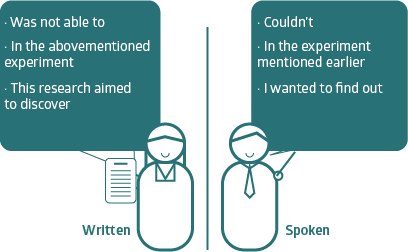Public speaking is the part of presentations that most people dread. Although it might not be possible to get over your nerves completely, good preparation and practice will give you confidence. Most confident speakers do lots of preparation and use notes well.
After you've written your script, practice and learn is—not so that you learn to say it by rote, but so that it will become easier to remember the important points to say, the links between the points (to maintain the flow of your 'story'), and the words and phrases that express your points clearly.
One way that we at ThinkSCIENCE can help you with this is through our audio recording service, in which a native speaker records your script at your chosen speed (native speed, slightly slower, or considerably slower). You can then use the recording to practice pronunciation, intonation, and pacing.
Again, if possible, try to avoid reading directly from your slides or script. Once you know your script, you can make a simple set of notes to jog your memory. If you are speaking instead of just reading, you can better engage with your audience and capture their attention.
Leave yourself adequate time to practice your presentation with your notes and slides. Check your timing, remembering that you might speak a little faster if you are nervous, and that you will need to account for changing slides and pointing at visual material.
As you rehearse, you will probably notice some words that are awkward to say, particularly if English is not your first language. Check pronunciation with a reliable source, such as www.howjsay.com, an online dictionary, or a native speaker, and then practice to avoid stumbling and putting yourself off during the presentation.
Practice can help you feel more comfortable with your material and more confident to present it to others.





